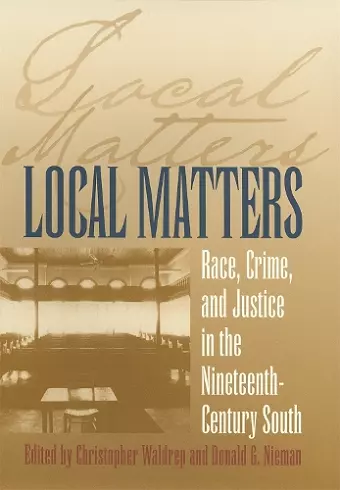Local Matters
Race, Crime, and Justice in the Nineteenth-Century South
Format:Paperback
Publisher:University of Georgia Press
Published:1st Dec '11
Should be back in stock very soon

Much of the current reassessment of race, culture, and criminal justice in the nineteenth-century South has been based on intensive community studies. Drawing on previously untapped sources, the nine original papers collected here represent some of the best new work on how racial justice can be shaped by the particulars of time and place.
Although each essay is anchored in the local, several important larger themes emerge across the volume—such as the importance of personality and place, the movement of former slaves from the capriciousness of "plantation justice" to the (theoretically) more evenhanded processes of the courts, and the increased presence of government in daily aspects of American life.
Local Matters cites a wide range of examples to support these themes. One essay considers the case of a quasi-free slave in Natchez, Mississippi—himself a slaveowner—who was "reined in" by his master through the courts, while another shows how federal aims were subverted during trials held in the aftermath of the 1876 race riots in Ellenton, South Carolina. Other topics covered include the fear of black criminality as a motivation of Klan activity; the career of Thomas Ruffin, slaveowner and North Carolina Supreme Court Justice; blacks and the ballot in Washington County, Texas; the overturned murder conviction of a North Carolina slave who had killed a white man; the formation of a powerful white bloc in Vicksburg, Mississippi; agitation by black and white North Carolina women for greater protections from abusive white male elites; and slaves, crime, and the common law in New Orleans.
Together, these studies offer new insights into the nature of law and the fate of due process at different stages of a highly racialized society.
Examining how institutions operated on the ground, these essays emphasize that Americans' apparent dedication to legalism was a highly complex matter. With their focus on the nineteenth-century South, moreover, they do much to reveal the interactions of race, class, and gender in a society where ideals of democracy and hierarchy created a tension that could never be easily resolved. . . . A valuable contribution to the study of the nineteenth-century South. Its essays tell us much about southern legal history. They also do much to demonstrate the relevance of that history to our understanding of the larger complexities of the region and of the nation as a whole.
Deep research, persuasive interpretation, and graceful prose all commend this excellent volume to the reader.
The editors should be commended for developing a tightly organized and focused collection that is certain to advance debate concerning the legal system and extra-legal violence in the nineteenth century South.
[T]his collection of essays valuably exploits the sometimes difficult to access riches of local records to offer a number of compelling interpretations of race and law in southern locales in the nineteenth century. Moreover, due to its excellent integrative introduction, it hangs together better than many anthologies do. It is highly recommended to all interested in the social history of American law and in the social history of the American South.
Local Matters is a fine anthology of painstakingly researched and well-written essays, each an example of how archival research can illuminate the conventional legal record.
ISBN: 9780820340814
Dimensions: 229mm x 152mm x 16mm
Weight: 431g
264 pages